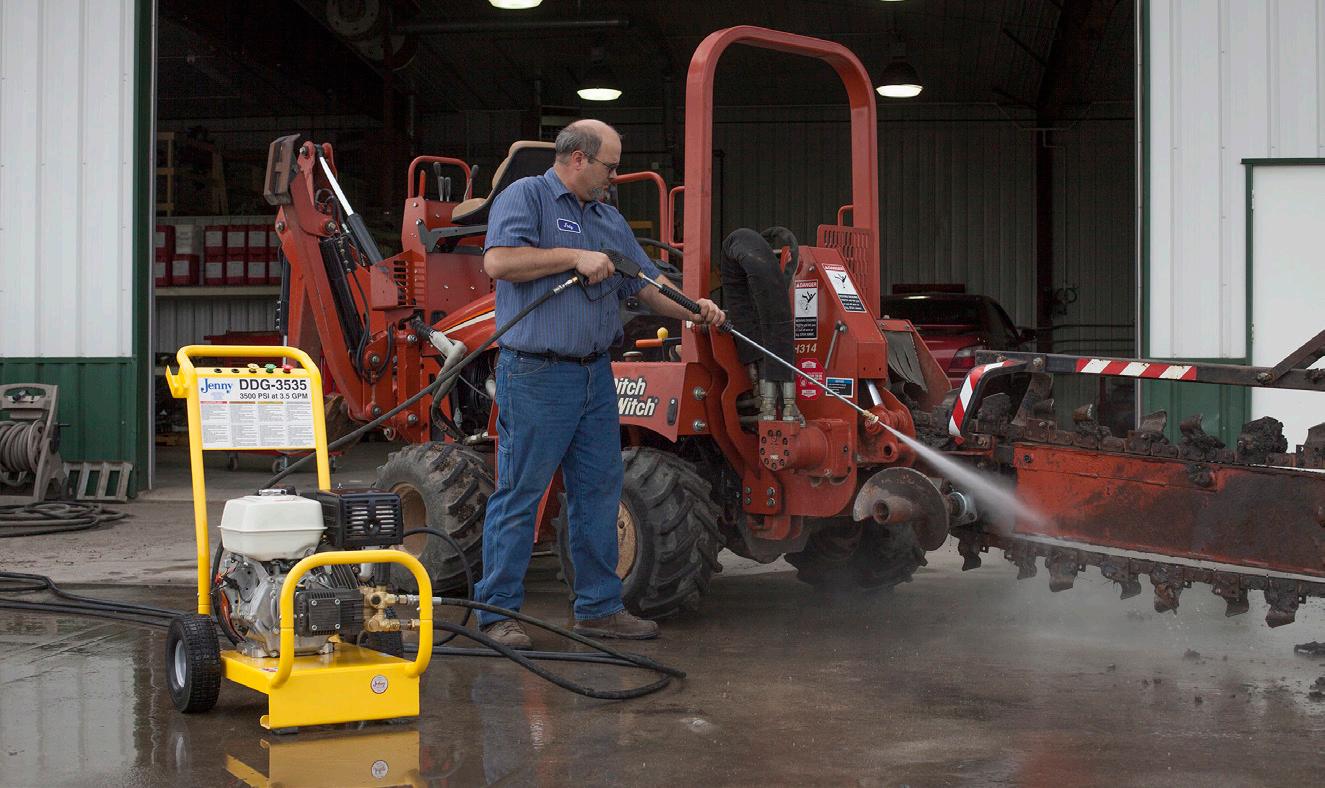
2 minute read
GENERAL TOOL //
has broken the bond between a contaminant and a surface, users must wash the contaminant away. To ensure the contaminant washes away as efficiently as possible, users need to have a very high water flow, which they’ll acquire with a high-volume unit. They must also remember another significant factor: horsepower, as it will determine how much pressure and volume a pressure washer can produce.
“As an example, a 3,000-PSI, 4-GPM unit requires at least an 11-hp gas engine to achieve high outputs,” Leiss says. “If users have a unit with less than 11 hp, it will deliver less pressure and volume than its pump’s rating.”
Regarding the primary differences between hot- and cold-water pressure washers, Leiss adds that cold-water units are the most popular, as they’re not only compact and cost effective, but they’re able to successfully conduct a wide range of cleaning tasks. Normally, cold-water units are most suitable for washing away dirt and mud, which covers several applications.
However, as users attempt to remove grease or grime, they won’t have clean surfaces while using coldwater pressure washers. Instead, substances will only be pushed around.
“For grease, grime and oil, a hotwater pressure washer is typically a better choice, as hot water will actually cut through grease and loosen it from the surface,” Leiss says. “Once the bond between grease and the surface is broken, it can then be washed away.”
If speed is critical (and it usually is), hot-water pressure washers will also clean 40 percent to 60 percent faster than cold-water units that are the same size, according to Abrahams.
“The performance of either a hotor cold-water pressure washer can be enhanced by using cleaning chemicals,” Leiss says. “The right detergent will help the cleaning process go more smoothly.”
In the meantime, the selection between an engine-powered pressure washer and an electric offering is primarily tied to a user’s mobility. If a user is going to clean in the same spot all the time, an electric pressure washer is suitable—if there is enough voltage available to run a high-performance machine, that is.
“High-performance industrial machines require 230 volts and 30 amps of power or more, depending on their sizes,” Abrahams says. “If users don’t have this power available, they’ll need to use engine-driven machines, as they don’t require any external power sources, enabling them to be used anywhere outside as long as water sources are available.”
Users must also remember that engine-driven pressure washers need well-ventilated spaces, due to exhaust and fumes, whereas electric-powered options can be used indoors or outdoors, leading to more possibilities.
Ask And Prepare
For a better sense of which pressure washers their customers need to retain within their fleets, rental companies should ask them various questions, according to Abrahams.

“Rental companies need to ask them what they’re cleaning and what the soil type is. Do they want electricor engine-driven pressure washers?” he asks. “If electric is desired, what type of power do they have on the site that has to be washed? If an engine-driven unit is required for mobility reasons, do they have water on-site? And, if not, rental companies should ensure they have a trailer system with a water tank.”
Accessories must not be overlooked either, including detergents, foam cannons, telescoping wands and turbo nozzles. The bottom line? As the pressure washing services industry continues to evolve—since, according to Anstoetter, more people are opening their own pressure washer businesses, the marketing for pressure washers is increasing and the demand for pressure washers is rising—rental companies need to be able to respond to the consistent changes in order to compete long term.
“Rental companies must develop relationships with their customers from the moment they walk in the door and then continue to build upon those relationships,” Abrahams says. “They should continue to ask questions, seek out the best solutions for each customer and ensure their customers have everything they need for each of their applications. As a result, they’ll stand out in the ever-changing industry—today, tomorrow and well into the future.”










